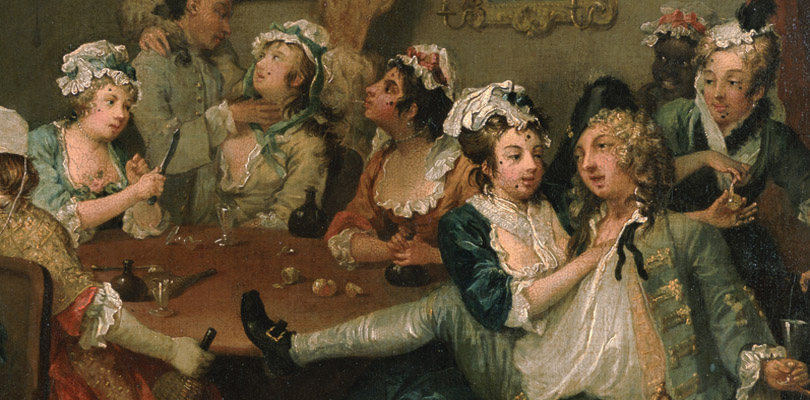
Hogarth: A Rake’s Progress
Sex, Booze and Debauchery in 18th-Century London
William Hogarth (1697-1764) grew up in the less than salubrious streets around Smithfield meat market in London. The British artist knew the underbelly of the metropolis from an early age and created a series of paintings satirising contemporary customs.
A Rake’s Progress (1733) tells the story of Tom Rakewell, a young man who follows a path of vice and self-destruction. The title alludes to John Bunyan’s allegory of Christian salvation, The Pilgrim’s Progress, but for Hogarth’s protagonists the only way was down, in torrid tales told through sequential narratives. Immerse yourself in a darkly comic world of inebriated harlots and rakish scoundrels.
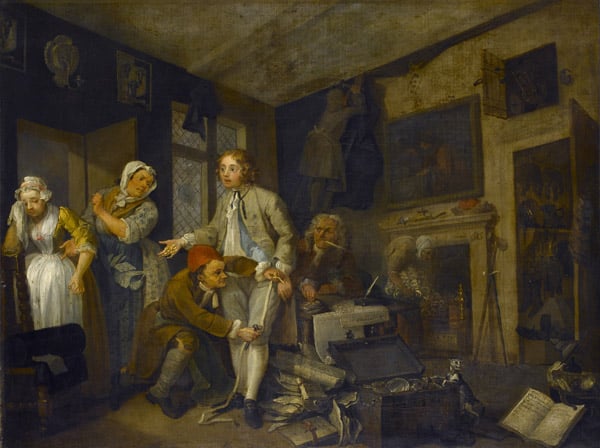
A Rake’s Progress I: The Rake Taking Possession of his Estate, 1733 by William Hogarth, Courtesy of the Trustees of Sir John Soane’s Museum, London
1. The Heir
Tom Rakewell, the son of a recently-deceased financier, has arrived home after inheriting his fortune. The scene is full of details underlining the wealth that has been hoarded in this unkempt, gloomy house. Behind Tom, a lawyer, employed to compile an inventory of his dead father’s estate, is stealing gold coins. Servants find treasure hidden in the fireplace and behind wall hangings.
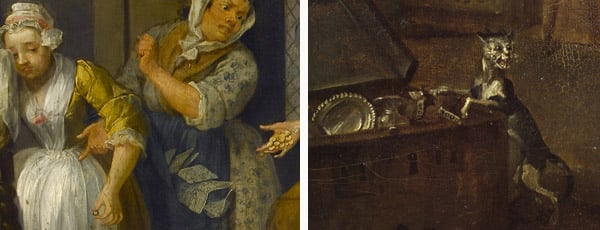
Details from ‘A Rake’s Progress I: The Rake Taking Possession of his Estate’, 1733 (oil on canvas) by Hogarth, Courtesy of the Trustees of Sir John Soane’s Museum,
Already Tom’s past is troubling him. Sarah Young, a sentimental representative of middle-class good nature and loyalty, has been seduced in part by promises of marriage; in her hand she holds a ring; and her mother carries love letters from Tom. Pregnant, she comes to Tom with her mother who confronts Tom with an animal fierceness (she resembles in expression the cat). Tom callously tries to buy the mother off as he postures to permit the tailor to continue his work.
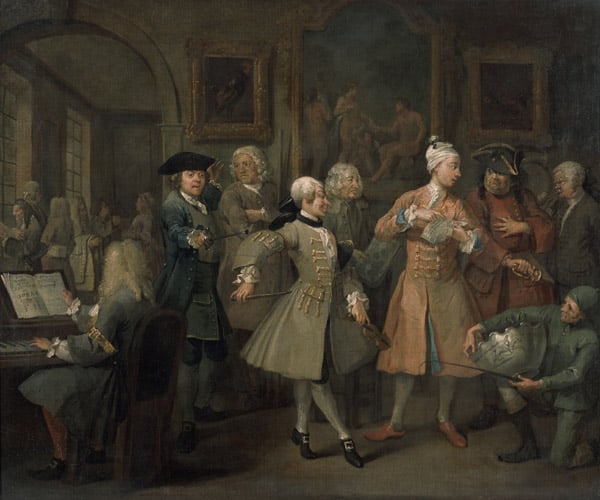
A Rake’s Progress II: The Rake’s Levee, 1733 by William Hogarth, Courtesy of the Trustees of Sir John Soane’s Museum, London
2. The Levee
In the second painting Hogarth shows Tom Rakewell as aspiring to be cultured like a young well-educated aristocrat, commissioning and sponsoring poets and musicians with no idea about what has merit. Tom’s lack of judgement and pursuit of pleasure will be his undoing.
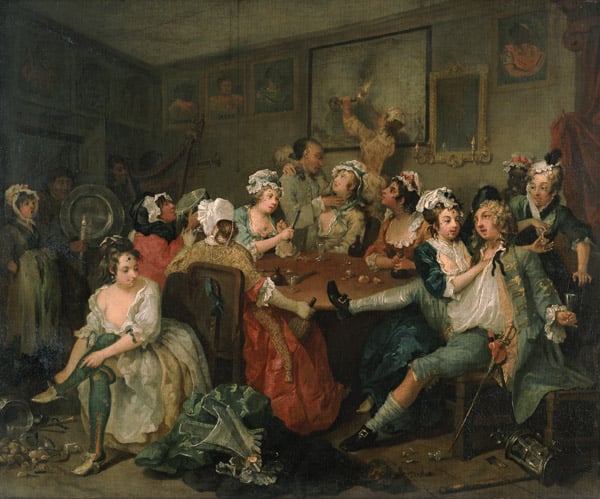
A Rake’s Progress III: The Rake at the Rose-Tavern by William Hogarth, Courtesy of the Trustees of Sir John Soane’s Museum, London
3. The Orgy
Tom, drunk, is enjoying the attentions of prostitutes at the Rose Tavern in London’s Covent Garden. Two of the ladies are relieving Tom of his watch and in the foreground a woman is undressing ready to perform poses on a silver platter that is being carried in by the waiter.
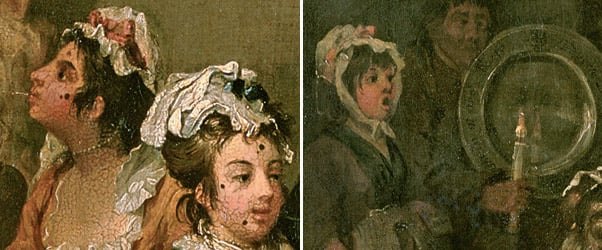
details from- A Rake’s Progress III: The Rake at the Rose-Tavern by William Hogarth, Courtesy of the Trustees of Sir John Soane’s Museum, London
The prostitutes have black spots on their faces to cover syphilitic sores. By the door stands a ragged ballad singer; her desolate state a warning to the harlots about the hazards of their occupation.
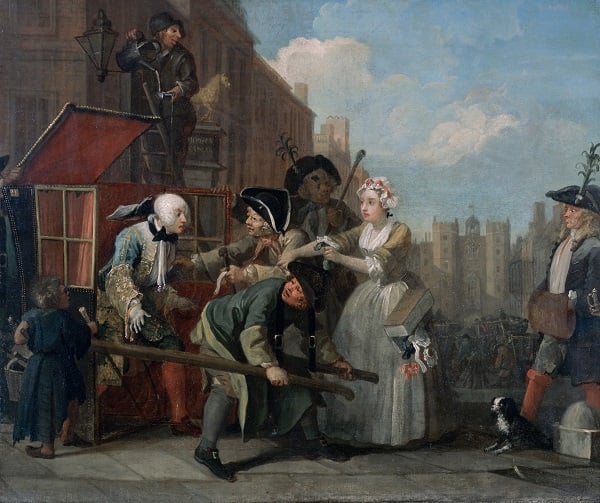
A Rake’s Progress IV: The Arrested, Going to Court, 1733 by William Hogarth, Courtesy of the Trustees of Sir John Soane’s Museum, London
4. The Arrest
Tom has squandered his fortune and is apprehended by a bailiff requesting payment of his debts. He is narrowly saved by Sarah, the girl he had earlier rejected. Some comic relief is provided by a lamplighter accidentally pouring oil on to Tom’s wig. This is a sly reference to how blessings on a person were accompanied by oil poured on the head; in this case, the “blessing” being the “saving” of Tom by Sarah, although he will not take the moral lesson to heart.
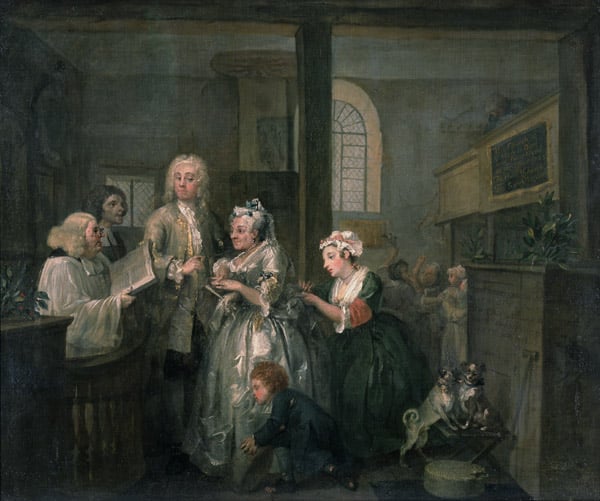
A Rake’s Progress V: The Rake marrying an Old Woman, 1733 (oil on canvas) by William Hogarth, Courtesy of the Trustees of Sir John Soane’s Museum, London
5. The Marriage
Determined to pursue his career as a gentleman, the rake repairs his fortune by cynical alliance to an ageing, one-eyed heiress. Unlike Tom she is undoubtedly looking forward to the wedding night.
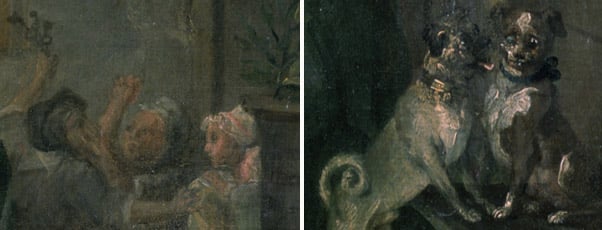
Details from A Rake’s Progress V: The Rake marrying an Old Woman, 1733 (oil on canvas)
In the background a churchwarden refuses entry to Sarah and the child Tom has fathered with her. Two dogs (one of which has lost an eye) present a grotesque parody of the marriage.
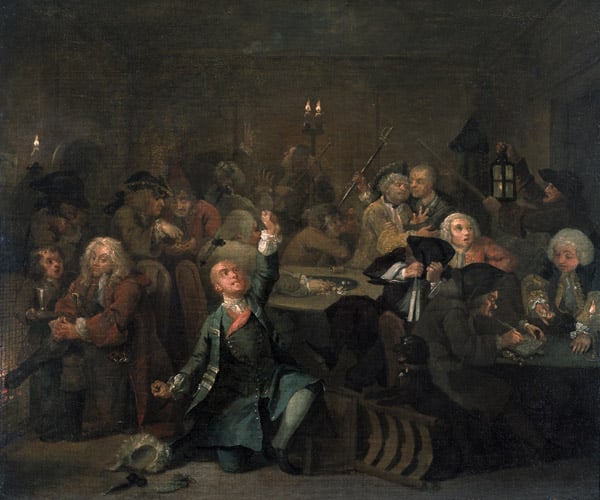
A Rake’s Progress VI: The Rake at a Gaming House, 1733 by William Hogarth, Courtesy of the Trustees of Sir John Soane’s Museum, London
6. The Gaming House
Tom, wigless and cursing his fate, has gambled away his second fortune in a dingy gaming den. Like the majority of the people in the room, he is too obsessed with gambling to notice that the building is on fire.
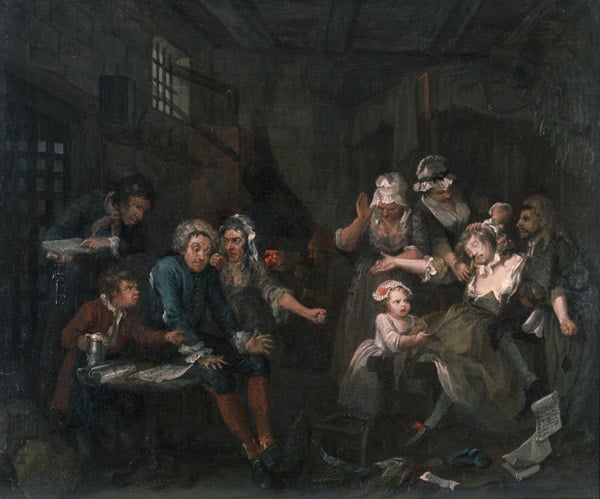
A Rake’s Progress VII: The Rake in Prison, 1733 by William Hogarth, Courtesy of the Trustees of Sir John Soane’s Museum, London
7. The Prison
Tom is now incarcerated in the notorious Fleet debtor’s prison and has sunk into despair. His wife scolds him for having squandered her fortune and faithful Sarah has fainted from distress at the scene. Beside him lies the rejected script of a play he has written in the hope of securing his freedom.
Both the beer-boy and the jailer demand money from him. Tom begins to go mad, as indicated by a telescope for celestial observation poking out of the barred window.
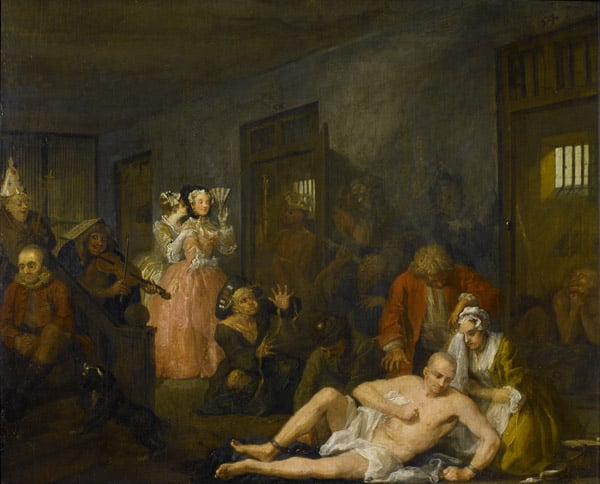
A Rake’s Progress VIII: The Rake in Bedlam, 1733 by William Hogarth, Courtesy of the Trustees of Sir John Soane’s Museum, London
8. The Madhouse
The final scene is set in Bethlehem Royal Hospital (Bedlam), London’s infamous mental asylum. He lies there almost naked stripped of everything including his sanity. Like the real Bedlam, Hogarth’s Madhouse is open to the public and wealthy ladies from the aristocracy look on. The irony is that, while Tom had set out to mimic the aristocratic lifestyle, he finishes by being one of its entertainments.
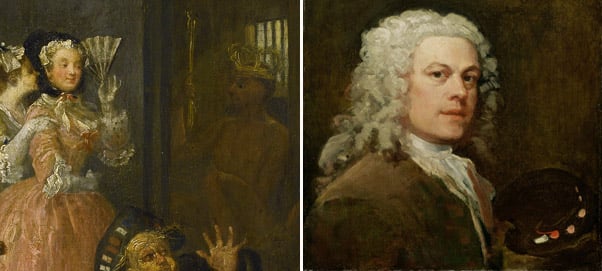
Left: The Rake in Bedlam, 1733 (detail)
Right: Self Portrait, (oil on canvas) by William Hogarth, Yale Center for British Art, Paul Mellon Collection, USA
Find out more
The original paintings of A Rake’s Progress are in the collection of Sir John Soane’s Museum in Lincoln’s Inn Fields, London, together with The Election series.
The Museum is the former residence of Sir John Soane, architect of the Bank of England. Explore architectural drawings, antiquities and works by works by Turner, Canaletto and Piranesi as well as two sets of paintings by William Hogarth.
Images from Soane’s collection are available to download and license via Bridgeman Images.
Get in touch with the Bridgeman team on uksales@bridgemanimages.com
Save
